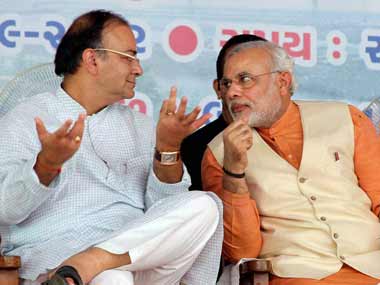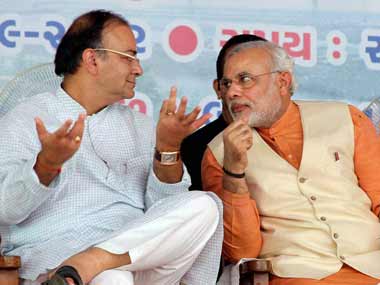When the Narendra Modi government issued an ordinance on 29 December to amend the UPA’s growth-killing Land Acquisition Act, it was essentially throwing a challenge to the combined opposition: do your worst. Given the instant rejection of the ordinance by many opposition parties, clearly the budget session of parliament will be a torrid one. One hopes Narendra Modi and Arun Jaitley have thought through the follow-up action on how they are going to get the bill passed. For, any failure to get a decent version of it through will mean a serious loss of business confidence - the one thing that the BJP has managed to create and cannot afford to lose. A failure on this front will send wrong political and economic signals all across. A wounded government that everyone in the opposition is targeting is the last thing the country needs needs. To succeed, the government will have to fight not only a fairly united opposition, but its own Sangh mischief-mongers too. The opposition is already gathering steam. Jairam Ramesh, the author of the Act that is universally disliked in most states, said the Congress would oppose the changes. Mamata Banerjee, the Trinamool Congress’s eternal rebel, said she would let the law pass over “my dead body.” The Left will also oppose the idea. Bad, populist laws usually have universal support in public even though most parties would privately agree that the Land Act is particularly prejudicial to growth. In June, when Nitin Gadkari held a meeting of state revenue ministers, requests for changes in the law were near universal. As _Firstpost_ noted at that time, many Congress-ruled states at that time - Maharashtra, Haryana, Karnataka, Kerala, Meghalaya, Uttarakhand and Himachal Pradesh - and all non-Congress, non-BJP states, “expressed serious reservations against the law,” while Delhi wanted total exemption from it. The BJP-ruled states of Gujarat, Chhattisgarh, Goa and Rajasthan wanted the Act scrapped. [caption id=“attachment_2024323” align=“alignleft” width=“380”]  Can Modi and Jaitley get the bill passed by Parliament? PTI image[/caption] But even if Mamata Banerjee was quiet about it, her bureaucrats were worried it would make land acquisition prohibitively expensive – if not impossible. According to a Business Standard article, Banerjee does not want to pay four times the market value for all rural land – which is what the law demands. She will pay only twice the amount unless the rural land is at least 120 km away from any urban area. The newspaper quoted a state government official as saying that “the price of land in rural areas adjacent to cities is already quite high. It will be only fair that rural areas are graded on distance and the compensation fixed accordingly.” Now, of course, her party will be at the forefront of the efforts to skewer the bill when it comes to the Rajya Sabha. Let’s be clear. Barring the Congress, which saw this legislation as its crowning achievement, the rest of the opposition will blackball the bill purely for the sake of giving the BJP a black eye. So if the government has still gone ahead and issued the ordinance, it will have to be clear it can pull this off. Modi will, in fact, have to fight on two fronts - the opposition parties and the Sangh hotheads. If we have any more Sadhvis and Sakshi Maharajs and Bajrang Dals cutting loose and talking nonsense, the budget session of the Rajya Sabha will also be a washout like the winter session was. So the first fight Modi has to win is against his own parivar. He has to ensure that there is not a peep from them. If this does not happen, one can’t see him winning the legislative war. The next fight is, of course, the numbers in Parliament and the strategy to achieve those numbers. On paper, the NDA will have the numbers to pass the bill if all allies and non-belligerent opposition parties (AIADMK, BJD) are won over. Modi also has to win over his existing NDA allies - the Shiv Sena, TDP, Akali Dal and LJP, among others - by suitable discussions and offers of some sops to them. Even allies will not sign up without concessions, for they have constituencies to nurture. Strategically, since the chances are that the Rajya Sabha, even if it functions, will send the bill to a select committee, the government should pre-empt that by setting up a select committee in the Lok Sabha itself. The committee can get the work done quickly and ready the bill for passing after the customary budget break in March-April. It is worth recalling that the insurance bill went to a joint committee in the Rajya Sabha and by the time it was ready to pass the bill, the Sadhvis and the Sangh parivar had made disruptions the order of the day. Once the select committee’s bill on the Land Act is adopted by the Lok Sabha - with or without changes - the Rajya Sabha’s only job is to accept or reject it. This means the Rajya Sabha must not be given any reason by the Sangh or anyone else to disrupt it - though an opposition committed to disrupting it will anyway do so. If the Rajya Sabha rejects the bill, it is only then that a joint session of parliament can be called. Having dared the opposition to do its worst, the Modi government has to ensure that it has all the angles covered. The country cannot afford any failure on this front.
To get the get its Land Acquisition Law changes passed by parliament, the Modi government will not only have to fight the opposition, but disruptionists from its own Sangh parivar
Advertisement
End of Article
Written by R Jagannathan
R Jagannathan is the Editor-in-Chief of Firstpost. see more


)

)
)
)
)
)
)
)
)



